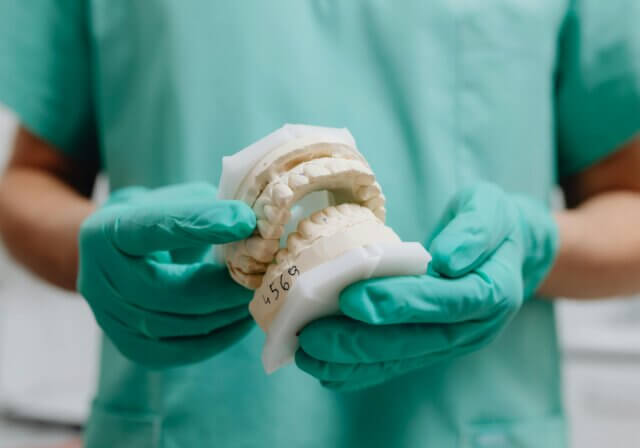At Kelowna Dental Centre, we’re obsessively passionate about ensuring every patient that walks through our doors achieves optimal oral health and improves their overall well-being.
And on that note, I’m excited to discuss one of my favourite topics in oral health today: implant-supported dentures, which can be a life-changing treatment option capable of significantly impacting one’s quality of life and overall health.
In this article, I’ll dive deep into the benefits of implant-supported dentures, why unsupported dentures can actually negatively impact a patient’s health, and how implant-supported dentures boast unique aesthetic benefits while enhancing the patients’ oral functionality and psychological well-being.
Unsupported Dentures: Functionality and Life Expectancy Considerations
Dentures may be an inevitability for some patients due to dental deterioration or loss of teeth for various reasons. And while unsupported dentures can provide desirable aesthetic results and restore the ability to smile, their functionality is generally quite limited.
In fact, unsupported dentures can significantly decrease a patient’s life expectancy (sometimes by as much as 10 years!). This may be surprising, but it’s crucial to consider when choosing the best treatment option for missing or deteriorating teeth.
The functionality of unsupported dentures is often erroneously compared to natural teeth. In fact, research suggests that the chewing function of unsupported dentures can be as low as just 5-10% of what natural teeth allow for. This can profoundly impact a patient’s ability to properly chew, break down, and digest food to obtain essential nutrients. Even chewable soft foods may be difficult to break down with unsupported dentures, preventing the digestive system from absorbing nutrients and leading to potential nutritional deficiencies. As a result, the life expectancy of unsupported denture wearers can decrease significantly, impacting their overall health and well-being.
Another crucial consideration regarding the negative impacts of unsupported dentures on oral health is the loss of bone and soft tissues in the jaw. Unsupported dentures may cause the jaw bone and its surrounding tissues to deteriorate over time without adequate stimulus.
This can result in the lower third of the face—including the chin and surrounding areas—appearing shrunken or sunken, commonly referred to as the “upside-down frown,” “widow’s peak,” or “witches chin.” Unsupported dentures, being a last resort option, are simply ill-equipped to deliver the necessary stimulus to prevent this bone loss.
However, implant-supported dentures CAN (and do) serve as a highly effective solution to mitigate these concerns.
Implants and Dentures: How They Can Work Together
First, let’s discuss how dental implants and dentures interact and work together to form this unique treatment option.
Dental implants are like anchors of the bone that replace a tooth’s roots. These titanium posts are surgically placed into the jawbone and provide a stable foundation for attaching restorations such as dentures or porcelain bridges.
When dentures are attached to implants, their functionality increases significantly. Patients can regain the ability to chew any food they want and adequately break down and absorb the nutrients from their food. This will, of course, result in a positive impact on their overall health and well-being.
Implant-Supported Dentures: Aesthetic Advantages
Another concern with traditional dentures is that the fit and aesthetics may change over time due to changes in a patient’s underlying bone structure. As the jaw bone resorbs, dentures can become loose, resulting in discomfort, difficulty speaking, and changes in facial appearance.
However, implant-supported dentures—being securely anchored to dental implants—do not experience these issues. Implant-supported dentures provide a stable and natural-looking solution, preserving the smile’s aesthetics and facial features.
Implant-Supported Dentures: Functional and Psychological Benefits
Implant-supported dentures can also improve speech, as they do not move or slip while speaking. This can boost patients’ confidence, allowing them to communicate freely without fearing their dentures shifting or falling out.
Additionally, implant-supported dentures can enhance the taste sensation, as they do not cover the palate, unlike traditional dentures, which can impede one’s ability to taste food properly.
In addition to the functional advantages, implant-supported dentures offer other significant benefits. One of the psychological components is the confidence of having a fixed denture that does not come out. Unlike removable dentures, which can cause discomfort or embarrassment, implant-supported dentures stay securely in place, providing patients with increased confidence in their smiles and overall appearance.
Implant-Supported Dentures: More Cost Effective
Although the upfront cost of implant-supported dentures may be higher than traditional dentures, they are significantly and unequivocally more cost-effective in the long run. Traditional dentures require frequent adjustments, realignments, or even replacements due to changes in the patient’s underlying bone structure and denture fit.
On the other hand, implant-supported dentures are more stable and durable, reducing the need for frequent repairs or replacements. We’re also proud to offer personalized in-house financing plans to suit any budget. This leads to substantial long-term cost savings, making implant-supported dentures a wise investment in your oral health and well-being.
Good Oral Hygiene is ALWAYS Essential
Like natural teeth, implant-supported dentures require proper oral hygiene to ensure longevity and effectiveness. Patients need to brush and clean their dentures and maintain regular visits to their dentist for check-ups and professional cleanings. Good oral hygiene practices, combined with regular dental care, can help prevent complications and ensure the long-term success of implant-supported dentures.
The Implant Placement Process
The process of getting implant-supported dentures involves several stages. It starts with a thorough dental examination and treatment planning. Our team will evaluate the patient’s oral health, bone structure, and other factors to determine if the patient is a suitable candidate for implant-supported dentures. The implant placement procedure can be scheduled if this initial assessment tells us that a patient is a suitable candidate.
The implant placement procedure is typically performed under local anesthesia with IV sedation, and titanium implant posts are surgically placed into the jawbone. But it’s important to keep in mind that the healing process from this first phase is certainly no picnic – it can last months, during which the implants fuse with the bone in a process called “osseointegration,” providing a stable foundation for the dentures. But the results are well worth the wait. And don’t worry, you get teeth the same day your implants are installed, which is what we refer to as “teeth in a day!”
Once the implants have fully integrated with a patient’s bone, abutments (also called “connectors”) are attached to the implants to support the dentures. Impressions are taken to create custom-made dentures that fit precisely over the corresponding abutments. Dentures are then attached to the abutments, and our team will ensure that they fit correctly and provide optimal function and aesthetics.
After getting implant-supported dentures, proper post-treatment care is essential to ensure their long-term success. Patients must follow our team’s personalized instructions on oral hygiene practices, including brushing and cleaning the dentures and regular dental visits for check-ups and professional cleanings. It is also vital to generally avoid hard or sticky foods that may put excessive pressure on the dentures or implants.
Ready for Implant-Supported Dentures to Change Your Life?
We learned today that implant-supported dentures are a potentially life-changing treatment option that significantly enhances the aesthetics, function, and psychological well-being of patients with missing teeth.
Compared to traditional dentures, implant-supported dentures offer numerous benefits, including improved chewing function, better nutrient absorption, increased confidence, preserved facial aesthetics, and long-term cost-effectiveness.
With proper oral hygiene and regular dental care, implant-supported dentures can provide a stable, durable solution for patients with missing teeth, allowing them to enjoy a better quality of life.
If you’re considering implant-supported dentures to improve your oral health, get in touch with us today. We’ll walk you through the entire process and make sure you feel comfortable and heard during your consultation.
Click here to book your next dental appointment – we can’t wait to care for you!
Dr. Michael Webster
Kelowna Dental Centre Owner
General Dentist
Sedation Dentistry
Kelowna Implant Dentist
Dental Implants Kelowna




